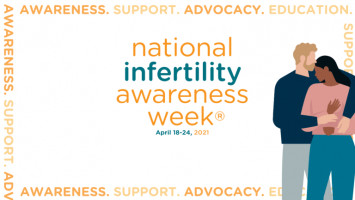Obesity is reaching epidemic proportions in the United States with over 2/3 of us being at least overweight. This has a profound impact from a medical, economic and social standpoint. Medically, obesity is associated increased risks of cardiovascular disease, diabetes, gallbladder disease, sleep apnea, osteoarthritis and certain types of cancers. The economic costs are staggering as well, with healthcare costs expected to rise by $66 billion dollars over the next 15 years due to obesity alone.
Obesity impacts reproductive function at a variety of levels in both men and women. This has been shown in both natural populations and infertile populations. Obesity affects men thru hormonal alterations, erectile dysfunction, cardiovascular and metabolic alterations, altering the DNA and mitochondrial function of the sperm and possibly temperature regulation in the scrotum.
In women, obesity reduces the chance of pregnancy even with treatment. In IVF, more drugs are required, responses are slower, fewer eggs are retrieved, fewer good quality embryos develop and fewer embryos are available for cryopreservation. All of this suggests that the egg is negatively impacted.
Obstetric outcomes are clearly worsened by obesity. In obese women, miscarriage rates are increased by about 50%, whether conceiving naturally or with assistance. Pre-eclampsia, gestational diabetes, pre-term delivery, and birth defects are all increased when the patient is obese. Additionally, Intrapartum problems include difficulty in estimating fetal weight, maintaining external monitoring, more difficult to perform emergency C-sections, more difficulty with epidurals, intubations.
Weight loss has been shown to reduce risk and improve pregnancy outcome. The initial weight loss strategy should be diet and exercise. If that is not effective, closely monitored medical therapy can be helpful. If medical treatment is not effective then bariatric surgery can be considered. Bariatric procedures are not associated with adverse perinatal outcomes.
Obesity is an epidemic that impacts society at multiple levels and has a detrimental impact on reproductive function and pregnancy. At Coastal Fertility Specialists, we are committed to optimizing outcomes for our patients and weight loss can be an important intervention. Weight loss is complex and behavioral in nature and requires a systematic plan of attack. Weight loss is also a lifestyle change that requires motivation and commitment. Appropriate education and a multidisciplinary approach can not only result in a successful weight loss and pregnancy, but also an overall long-term health for a family.
Related Posts

October 04, 2014
Pregnant Over 40?

June 22, 2016
The Stress of Infertility: Treating Patients with Compassion

November 07, 2017
Why do Chromosomally Normal Embryos Not Implant in the Uterus?

November 21, 2019
How to Keep Your Fertility Treatments on Track When Traveling for the Holidays

June 24, 2020
Electronic Cigarette Use in Reproductive Age Women



